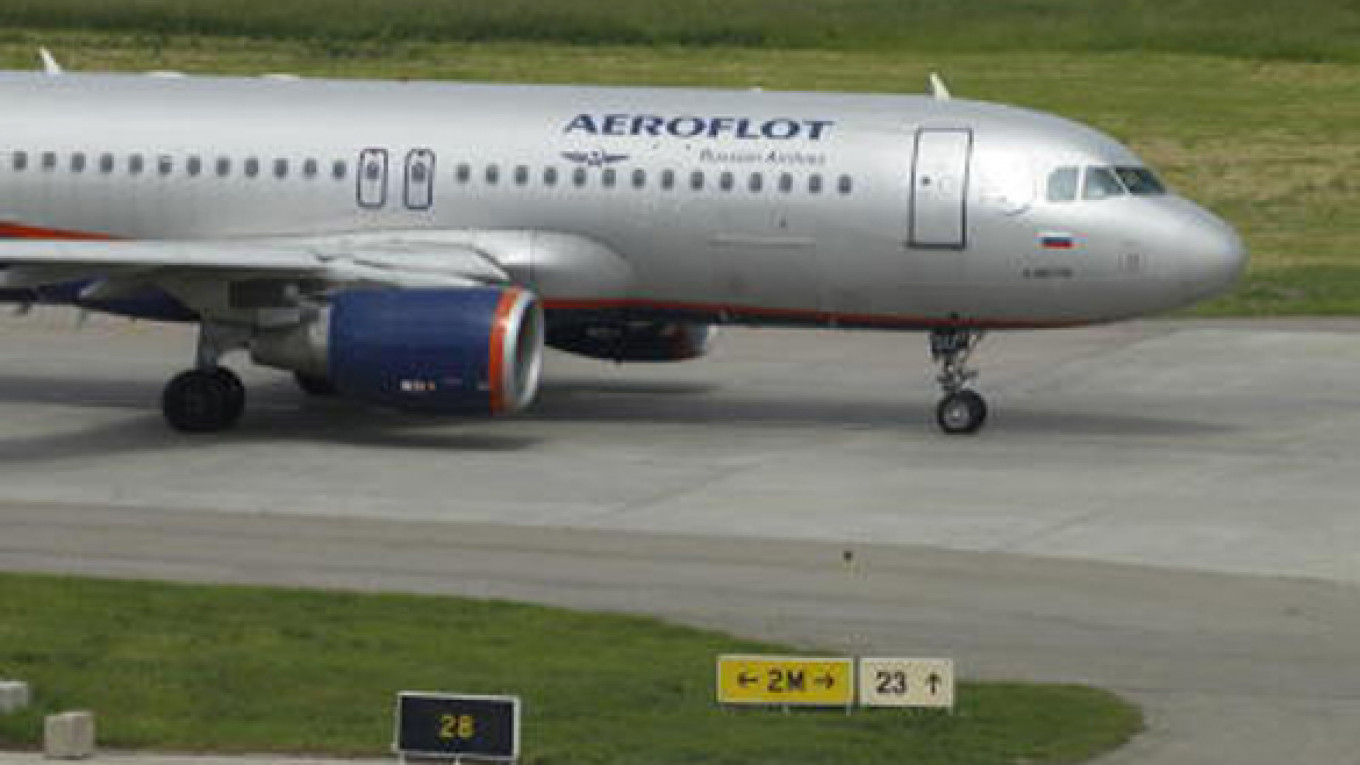As pilots and flight assistants of Russia’s flag-carrying airline strive to get a raise from their employer for night flights and harmful working conditions, a lack of qualified personnel amid double-digit growth in passenger numbers has been revealed as a major problem.
About two dozen members of the Sheremetyevo Cockpit Personnel Association, or SCPA, a labor union fighting for the rights of airline employees, and three members of the State Duma gathered before the Aeroflot office on Arbat in Moscow on Tuesday, claiming that the airline personnel had not received the additional payments to which they were entitled.
Also, they said the overall working conditions at the airline posed a threat to the safety of its passengers.
The SCPA said earlier that Aeroflot owed its pilots and flight attendants over 1 billion rubles ($30 million) for flying at night and in harmful working conditions, citing the Labor Code.
The labor union was told to go to court, which they did.
After a series of court hearings and appeals, the Moscow City Court ruled in July that Aeroflot was obliged to pay out the debt over a period of 17 months, from March 2011 to August 2012.
“The company started to make payments ordered by the court from Sept. 2,” a spokesman for Aeroflot said Tuesday.
But the SCPA, which has some 900 active members out of the 1,400 pilots that Aeroflot employs, said they had not received any of those payments yet.
Six pilots who came to the rally before the Aeroflot office Tuesday confirmed this information to The Moscow Times. They did not identify themselves out of fear of possible retaliation by their employer.
Aeroflot captain Igor Deldyuzhov, who is also the head of SCPA, was fired in March last year for enlisting a third pilot on a long flight between Moscow and Tokyo, which went against current airline regulations. He was later reinstated by a court order.
His SCPA deputy Valery Pimoshenko, also a first pilot, was fired under the same circumstances but, unlike Deldyuzhov, did not go to court.
“I have been fully restored, and I am flying as I did before, although Aeroflot said in a statement that I would not be allowed to fly,” Deldyuzhov said in a telephone interview. He said he had been unable to attend the protest on Arbat because he had been urgently summoned to Sheremetyevo Airport.
He also said firing pilots, especially if they were members of a combative labor union, was an attempt by the airline’s management to put pressure on them and show who was in charge.
“As for the money the company owes us, I did not get any of it and do not know anyone who did,” the pilot said. “Why don’t they publish a list of people who will get paid, when and in what amount — that would be fair,” he added.
An unidentified Aeroflot official was present at the meeting. When asked to present some documents that would prove the company had started the payments, he declined, saying he was not authorized to speak to the press.
“The problem with these payments is just the tip of the iceberg,” said SCPA spokesman Igor Obodkov. “Another major issue is constant violations of the Labor Code’s provisions on working hours and corresponding days-off.”
There were numerous cases when pilots’ vacations were long overdue, which led to fatigue, he said. Also, because of a lack of pilots, the flight schedule got hectic at times and pilots were called for work at short notice.
But Aeroflot has argued that its working conditions complied with Russian law.
“We are a major company, always in the spotlight, and are subject to frequent checks by the authorities to make sure we follow the rules,” airline spokesman said.
However, SCPA members said uncomfortable working conditions were the reason why pilots either changed airlines or opted for early retirement.
“Aeroflot says they are short by over 100 pilots but, according to our estimates, around 150 pilots have quit the airline over the last few years and only a small portion of these retirements were due to health problems or old age,” Deldyuzhov said.
In July, Aeroflot carried over 2 million passengers, up 20 percent from the same period last year. The company’s revenue for the first half of the year exceeded 92 billion rubles, 19 percent higher than in the first half of 2012.
Contact the author at a.panin@imedia.ru
A Message from The Moscow Times:
Dear readers,
We are facing unprecedented challenges. Russia's Prosecutor General's Office has designated The Moscow Times as an "undesirable" organization, criminalizing our work and putting our staff at risk of prosecution. This follows our earlier unjust labeling as a "foreign agent."
These actions are direct attempts to silence independent journalism in Russia. The authorities claim our work "discredits the decisions of the Russian leadership." We see things differently: we strive to provide accurate, unbiased reporting on Russia.
We, the journalists of The Moscow Times, refuse to be silenced. But to continue our work, we need your help.
Your support, no matter how small, makes a world of difference. If you can, please support us monthly starting from just $2. It's quick to set up, and every contribution makes a significant impact.
By supporting The Moscow Times, you're defending open, independent journalism in the face of repression. Thank you for standing with us.
Remind me later.






